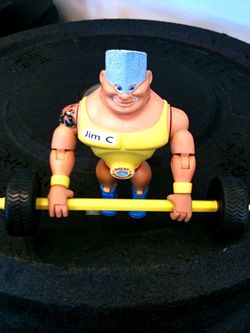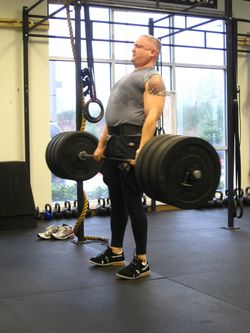Burpees…then rest. Get going and do all 47 of them. Then post to comments if you are still in.
Jim C. has his own action figure. That is big time!
New challenge: Find another action figure for someone in the gym!
Today’s topic:
Overreaching vs. overtraining. It’s vital to understand what both are before you diagnose yourself incorrectly. It’s also vital to knowing what these are to proactively work on prevention so as to not impact your training and decrement your physical and mental work capacity. It’s all about progress and if you are not sure what these two terms are you can easily go from overreaching to inevitably overtraining. I say avoid it so you can be on the path for making PR’s and gains.
First the definitions:
Overreaching: An accumulation of training and/or non-training stress resulting in a short-term decrement in performance capacity with or without related physiological and psychological signs and symptoms of overtraining in which restoration of performance capacity may take from several days to several weeks.
Overtraining: An accumulation of training and/or non-training stress resulting in a long-term decrement in performance capacity with or without related physiological and psychological signs and symptoms of overtraining in which restoration of performance capacity may take from several weeks to several months.
Overreaching is okay, it can be dealt with, it can usually be mitigated with proper rest and recovery, proper training balance and recognizing and avoiding overtraining scenarios. It’s listening to your body. I would argue if you aren’t flirting with overreaching from time to time you won’t ever recognize your athletic potential. If you want peak performance, you have to push near that zone. It’s NOT the same though as coming into the gym and doing a couple intense workouts a week so you are sore and tired and doing little to nothing else. That is okay and that will put you on the path to progress, but combine it with some frequency, consistency and proper nutrition and you will watch the results come.
Overtraining is usually a combination over time of poor sleep, high volume training, very frequent high intensity workouts, poor nutrition (both sustained and pre and post WOD), using too much overload (way to high of a weight or rep count), and external mental and physiological stressors. The key is over time. You can cycle through periodization. Increasing training volume, type, intensity and load consistently and then tapering to properly recover prior to an event is smart and logical training methodology. It can lead to performance gains and new PR’s. Not resting properly as you go is not so smart.
Most people won’t experience this if their training volume is low to moderate. To make physiological progress you must play with progression, overload and recovery. Without repeatedly breaking down and building up your body for days, weeks, and months you will not make any necessary progress. However if you don’t factor in nutrition and rest then you are taking two steps back for each step forward. If you are feeling any of the following symptoms, then manage a rest day. Or two. Some prefer three days on, one day off with either little or very low intensity exercise on a rest day. Some do four on, one off, two on, one off. I recommend trying back to back days as a minimum. Make at least one of those rest days a true rest if you are going hard at it. Frequency, intensity, and consistency are keys to success, but balance is needed. Being sore isn’t a reason to not work out, feeling tired after a long day isn’t either, but feeling it consistently and being run down? Going on that 4th day and not “feeling it”? Take a rest.
Here are some symptoms of overtraining to look out for:
- Constant feeling of fatigue, lack of motivation
- Lack of or inability to sleep
- Poor nutrition or lack of hunger
- Decreased performance
- Increase of illness
- Mood changes
- Increased incidence of injury
- Extreme soreness
As Coach Glassman stated in this CF Journal article, the WOD is designed to tax the fittest of people. That is why we scale movement, load, quantity and intensity. It’s individually modified to fit you to measure your progress. Be smart and gain consistency before going like a junkyard dog with too much weight and poor form. As you improve your skill, technique and fitness level you will naturally amp up the intensity.
CrossFit works because it constantly drives physiological and neuromuscular adaptation, pushes your limits, forces you to not “go through the motions”. It mixes it up, keeps it fresh, and even exercises your mind. It makes exercise what it should be, tough yet fun. What sounds better? Hitting PR’s, learning and improving new skills, making gains, getting faster and stronger OR feeling lethargic, constantly fatigued, weaker, struggling constantly at not only learning new skills but improving on weaknesses, and increased risk of injury? The answer is obvious but overtraining is serious and something to be aware of. So be smart, have fun and know when to rest.
Enjoy that rest day, eat well, get some sleep, spend some time doing something else fun. Looks like I need my own advice! But first those burpees…
Notes:
Only 9 days into the new year and Rona achieved one of her 2010 Resolutions! Yesterday she performed 10 consecutive push-ups RX’d. Congratulations and we look forward to watching Rona (and the rest of you) cross off more and more! Here it is in her own words:
“I wanted to let you know that I got my first New Years resolution marked off my list. I did 10 push-up RX (on my toes) today. We finally had a workout that my arms weren’t jello afterward as I decided today was the day. I went form being able to do 3 push-ups on Jan 1st then 4, 5, 8 and today I made 10. The baby was asleep and no one else was home so I video taped it. I needed a record. I made Rob watch it when he got home. Sorry guys but you both are going to have to watch it too. :)”
Affiliate Cup Competition 2010 Update: Read the latest update on rules for the 2010 Affiliate Cup Qualifiers at the Regionals. The top 6 teams from our Northwest Regionals in May will be eligible to advance. Competition will be fierce. We will have our own selection process prior to Regionals that will be open only to our current Affiliate “Team Squatch” that is in training. We will choose 6 total athletes for the team. Details will be published later but rest assured it will be both an objective and subjective process that includes at least 6 WOD’s and some individual max effort/skill tests that cover all 10 components of fitness, as well as a subjective evaluation by your coaches.


